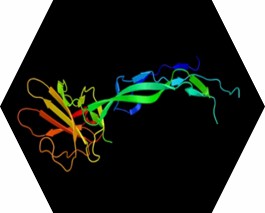TGF-β Family Ligands
Overview of TGF-β Family Ligands

The TGF-β (Transforming Growth Factor-beta) family is an essential group of cytokines that includes a wide range of TGF-β ligands. They regulate cellular functions and gene expression by interacting with receptors and triggering cell signaling pathways. In addition, they have significant roles in biological processes such as cell proliferation, differentiation, migration, embryonic development, and immune response.
In the growth and differentiation of mesenchymal stem cells, TGF-β family ligands affect the ability of stem cells to proliferate, apoptosis, and differentiate into multiple cell types. Studies have shown that TGF-β family ligands regulate stem cell fate decisions through the activation of specific signaling pathways (e.g., Smad signaling pathway) and provide support in extracellular matrix synthesis and degradation, thereby supporting the peripheral tissue environment of MSCs. To gain insight into the role of TGF-β family ligands in MSC biology, as well as their application in stem cell therapy and tissue engineering, researchers have used a variety of technological approaches to modulate their expression and function, such as gene overexpression, gene knockdown, and drug application. Therefore, the study of TGF-β family ligands is significant for the understanding of cell fate and stem cell biology, as well as for applications in stem cell therapy and tissue engineering.
Research Areas of TGF-β Family Ligands
The TGF-β family ligands are a group of proteins that play a key role in cell signaling. Members of this family include TGF-β1, TGF-β2, TGF-β3, BMP (Bone Morphogenetic Protein), Activin, Nodal, and others. As mesenchymal stem cell growth factors, the TGF-β family of ligands has attracted widespread interest and in-depth study in several research areas, some of which are listed below:
- Stem cell biology
TGF-β family ligands play a critical role in supporting stem cell self-renewal and differentiation. Researchers have conducted extensive studies on the mechanisms of how these ligands regulate stem cell fate to further understand the developmental and regenerative capabilities of stem cells.
- Cancer research
TGF-β family ligands play a dual role in tumor development. They inhibit the proliferation of tumor cells and promote tumor evasion from immune surveillance by suppressing the immune system's response to the tumor. By studying the role of TGF-β family ligands in the tumor microenvironment, scientists hope to develop new therapeutic approaches, including targeted therapeutic strategies against the TGF-β signaling pathway.
- Connective tissue diseases
TGF-β family ligands play an active role in the growth, development, and repair of connective tissues. Connective tissue diseases such as degenerative cartilage diseases and osteoporosis are closely associated with abnormal TGF-β family ligand signaling. Researchers are trying to elucidate the role of these signaling pathways in disease development and seek new therapeutic strategies.
- Developmental biology
TGF-β family ligands regulate organ formation, embryonic differentiation, and axial formation. Understanding the specific functions of TGF-β family ligands during development is important for unraveling the developmental mechanisms, and causes of abnormal development, and treating related developmental defects.
- Structural biology and drug design
By analyzing the structures of TGF-β family ligands and their receptors, researchers are trying to reveal the molecular mechanisms of their interactions. This can help guide drug design and the development of new therapeutic approaches, including the design of agonists or antagonists that target the TGF-β family ligand signaling pathway.
In conclusion, TGF-β family ligands play an influential role in the field of mesenchymal stem cell growth factor research, which involves a variety of subfields such as stem cell biology, cancer research, connective tissue diseases, developmental biology, as well as structural biology and drug design. By delving into the functions and mechanisms of TGF-β family ligands, scientists hope to further understand their biological roles and utilize this knowledge to develop innovative therapeutic approaches.


